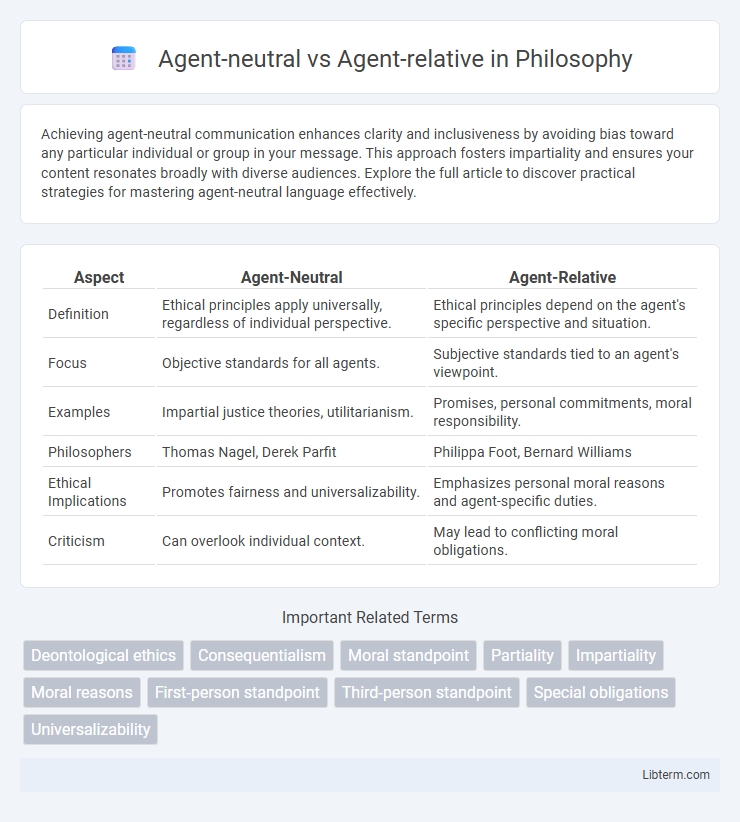Achieving agent-neutral communication enhances clarity and inclusiveness by avoiding bias toward any particular individual or group in your message. This approach fosters impartiality and ensures your content resonates broadly with diverse audiences. Explore the full article to discover practical strategies for mastering agent-neutral language effectively.
Table of Comparison
| Aspect | Agent-Neutral | Agent-Relative |
|---|---|---|
| Definition | Ethical principles apply universally, regardless of individual perspective. | Ethical principles depend on the agent's specific perspective and situation. |
| Focus | Objective standards for all agents. | Subjective standards tied to an agent's viewpoint. |
| Examples | Impartial justice theories, utilitarianism. | Promises, personal commitments, moral responsibility. |
| Philosophers | Thomas Nagel, Derek Parfit | Philippa Foot, Bernard Williams |
| Ethical Implications | Promotes fairness and universalizability. | Emphasizes personal moral reasons and agent-specific duties. |
| Criticism | Can overlook individual context. | May lead to conflicting moral obligations. |
Introduction to Agent-Neutral and Agent-Relative Ethics
Agent-neutral ethics emphasizes impartial moral principles applicable universally, regardless of the agent's personal interests or relationships, promoting obligations that hold for everyone equally. Agent-relative ethics prioritizes duties and moral considerations tied specifically to the individual agent's perspective, allowing for special obligations to oneself or particular others. Understanding the distinction between agent-neutral and agent-relative frameworks is crucial for analyzing ethical theories that balance universal moral demands with personal commitments.
Defining Agent-Neutral Reasons
Agent-neutral reasons apply universally, independent of any individual's personal goals or desires, serving as impartial justifications for action. These reasons emphasize objective criteria, such as moral principles or legal obligations, that hold true regardless of who considers them. Defining agent-neutral reasons highlights their role in ethical theory as grounds for actions that any rational agent can endorse, promoting fairness and consistency in decision-making.
Understanding Agent-Relative Reasons
Agent-relative reasons stem from an individual's personal commitments, relationships, or roles, influencing decisions based on subjective perspectives rather than universal principles. These reasons emphasize the importance of one's identity and moral obligations that other agents may not share, creating justification unique to the agent's standpoint. Understanding agent-relative reasons requires recognizing how personal considerations shape ethical judgments beyond impartial assessments.
Historical Background and Philosophical Origins
Agent-neutral and agent-relative perspectives trace back to classical ethical theories, notably Immanuel Kant's deontological principles and David Hume's sentimentalism. Kant's agent-neutral framework emphasizes universal moral laws applicable regardless of the agent's perspective, while agent-relative views align with Humean emphasis on personal involvement and particular relationships. These origins shape contemporary debates by grounding agent-neutral ethics in objective duty and agent-relative ethics in subjective commitments rooted in historical philosophical discourse.
Key Differences Between Agent-Neutral and Agent-Relative
Agent-neutral approaches emphasize actions independent of the specific agent performing them, focusing on universal principles and outcomes applicable to any actor. Agent-relative perspectives prioritize the context, intentions, and responsibilities tied to the individual agent, affecting moral evaluations and decision-making processes. Key differences include the scope of moral obligations, with agent-neutral ethics applying uniformly, while agent-relative ethics accommodate personal relationships and specific situational duties.
Prominent Philosophers and Their Views
Prominent philosophers like Immanuel Kant emphasized agent-relative reasons, arguing that moral duties arise from personal commitments and relationships, while Derek Parfit promoted agent-neutral perspectives, focusing on impartial principles that apply universally regardless of individual agents. Thomas Nagel contributed to this debate by highlighting the tension between subjective agent-relative reasons and objective agent-neutral considerations in moral reasoning. This philosophical discourse shapes contemporary ethics by contrasting personal obligations against impartial welfare maximization.
Agent-Neutrality in Utilitarianism
Agent-neutrality in utilitarianism asserts that moral evaluations do not depend on the identity of the agent, emphasizing impartial consideration of all individuals' welfare. This principle requires agents to act based on the greatest overall happiness rather than personal interests or relationships, aligning with the core utilitarian goal of maximizing utility universally. Agent-relative perspectives contrast by allowing moral reasons tied to the agent's own commitments, but utilitarianism's agent-neutral stance promotes equal moral weight for every individual's well-being.
Agent-Relativity in Deontological Ethics
Agent-relativity in deontological ethics emphasizes the moral duties and obligations that are specifically tied to the individual agent's role, relationships, or context, contrasting with agent-neutral principles that apply universally regardless of personal connections. This perspective acknowledges that certain duties, such as promises or familial responsibilities, are binding only for particular agents, reflecting a nuanced understanding of moral requirements grounded in one's identity and social roles. Agent-relative deontology thus allows for moral judgments that prioritize personal commitments and special responsibilities, shaping ethical decision-making through the lens of individual agency.
Implications for Moral Decision-Making
Agent-neutral perspectives prioritize impartiality by evaluating moral decisions based on universal principles applicable to all agents, promoting fairness and consistency in ethical reasoning. Agent-relative approaches emphasize the specific standpoint and interests of the individual making decisions, allowing for moral judgments that consider personal commitments and responsibilities. The tension between these frameworks influences debates on moral obligations, where balancing impartial moral duties with agent-specific concerns shapes ethical decision-making processes.
Conclusion: Balancing Agent-Neutral and Agent-Relative Approaches
Balancing agent-neutral and agent-relative approaches involves integrating objective standards with context-sensitive interpretations to enhance decision-making accuracy. Emphasizing agent-neutral principles ensures fairness and consistency across various scenarios, while incorporating agent-relative perspectives allows for adaptive responses tailored to individual agents' circumstances. Achieving equilibrium between these approaches optimizes ethical evaluation and practical applicability in complex environments.
Agent-neutral Infographic

 libterm.com
libterm.com